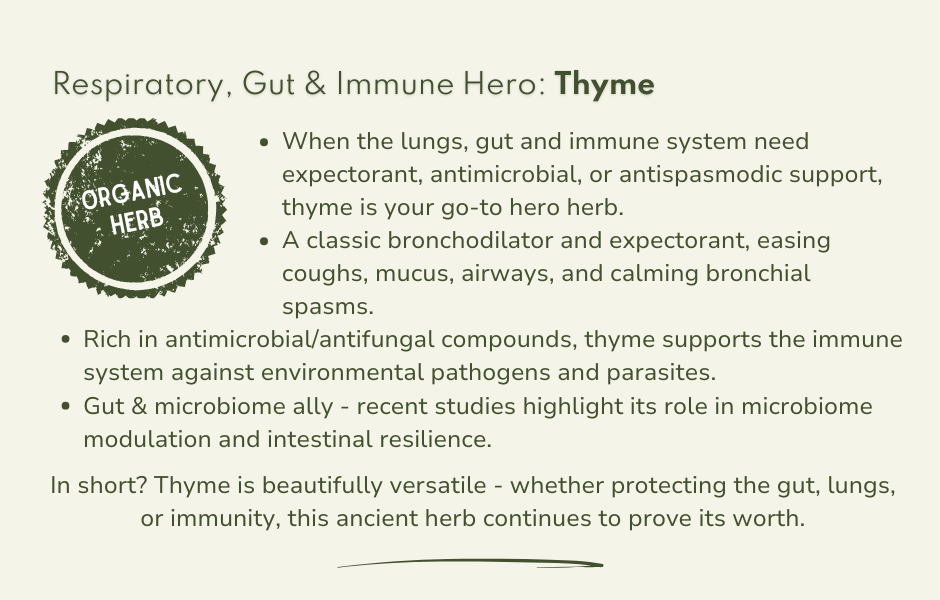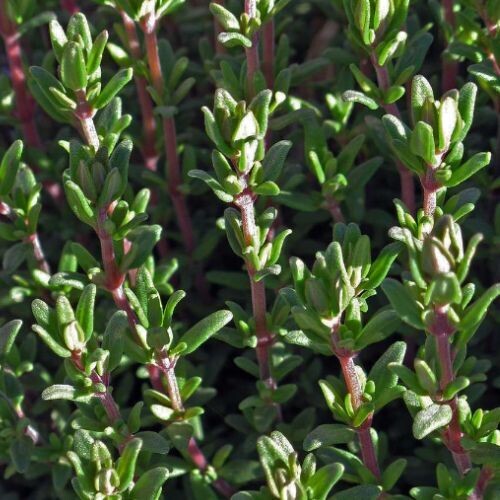THYME (Thymus vulgaris) *Organic herb for horses - aromatic defence, respiratory clarity, digestive resilience
Benefits of Thyme Herb for Horses
Long treasured for its powerful antimicrobial and respiratory benefits, this time honoured botanical has a rich legacy as a purifier, protector, and supporter of lungs, digestion, and immune health. From ancient temples to modern apothecaries, thyme remains a small but mighty herb for the body’s first lines of defence.
Please note this is a nutritional, functional horse food supplement and not veterinary medicine. See Dr Kellon's Horse Sense - Nutrition is not 'Alternative' Therapy .

Find Thyme in the EquiNatural range
We blend thyme into our VermClear parasite cleanser, and BiomeTonic intestinal balancer; as with oregano, sage, and rosemary, thyme is high in volatile oils which protect the intestinal environment for the benefit of the gut biome.
💧Organic Thyme Herb Tincture
Our human-grade, certified organic tinctures give you a ready-to-absorb potent source of phytonutrients at the highest-strength available, for immediate absorption straight into the bloodstream and to the body’s cells.
- Thymus vulgaris (Thyme)
- Leaf
- Cold Macerated 1:3 35%
- Organic Cultivated
~ Feed Guide - thyme tincture for horses
- 6ml/100kg bodyweight, daily in feed.
- ♻️ Our tinctures come in a heat-sealed, twin-neck, child-resistant HDPE plastic dosing bottle, complete with dosing chamber. *HDPE (High-Density Polyethylene) plastic is 100% recyclable, and energy-efficient to produce. Safe for food/water storage, it reduces waste and emissions while resisting wear. A top sustainable choice to match the EquiNatural ethos.
🌿Organic Dried Thyme Herb
Grown, harvested and dried without the use of agri-chemicals, non-irradiated and GMO free - see our Quality page for Quality Management & Certification Documents.
- Thymus vulgaris (Thyme)
- Leaf
- Organic Cultivated
- Origin Morocco
~ Feed Guide - dried thyme herb for horses
- 5g/100kg bodyweight per day, i.e. 25g for a 500kg horse.
- Want a scoop? You can add a scoop to your basket during checkout.
- ♻️Supplied in a 100% fully recylable, resealable, food-grade foil pouch for freshness.
Footnotes
- Laboratory tested for identification and compliance to the British and European Pharmacopoeia standards.
- Human grade.
- Please be aware that if you're purchasing our dried botanicals for human use, our dried range is cut to appropriate sizes for feeding to horses.
- ♻️ Eco Note: Our packaging is recyclable and refillable.
- 🧊 Storage Tip: Keep cool and dry.
Functional Nutritional Value
Constituents:
Volatile oils (thymol, carvacrol), tannins, flavonoids (apigenin, luteolin, thymonin, naringenin), labiatic acid, caffeic acid, saponins, resins.
Safety/Contraindications
- Thyme is generally considered to be safe, bar it being linked with uterine stimulation, so it should not be fed to the pregnant/nursing mare.
Thyme in History & Tradition
Thyme’s name stems from the Greek thymos , meaning spirit, strength, or courage - a thread that runs deep through historical and cultural use. In ancient Greece, thyme was burned in temples to purify spaces and evoke bravery. Roman soldiers exchanged sprigs as a sign of respect before battle. In medieval Europe, it appeared embroidered on knights' scarves or tucked under pillows to prevent nightmares and promote peaceful sleep.
Loved by bees and fairies alike, thyme has inspired folklore from the Scottish hills to Shakespeare’s fairy woods. The Victorians believed wild thyme patches marked where fairies had danced. In Norse mythology, wild thyme was sacred to Freyja, the goddess of love, beauty, and fertility.
Historically, thyme has also been associated with protection in every sense - against plague, poison, nightmares, and dark forces. The ancients bathed in it, burned it, wore it, and drank it. It was used to preserve food and embalm the dead, and it appears in nearly every herbal tradition, from Roman and Greek medicine to Chinese and Cherokee healing.
Its versatility extended beyond mythology and into deep herbal medicine. Thyme was recommended by Pliny the Elder for asthma and melancholy, by Hildegard von Bingen for infections and ulcers, and by medieval herbalists for women’s reproductive health. In monasteries and kitchens, it seasoned broths and protected meats from spoiling, all while lending its medicinal magic.
Today, thyme remains one of the most studied antimicrobial herbs, with thymol - its key volatile oil - recognised for potent expectorant, antiseptic, and immune-boosting qualities.
© EquiNatural 2026. All content is original work protected under copyright, and may not be re-published, duplicated, or rewritten for commercial use without permission.


